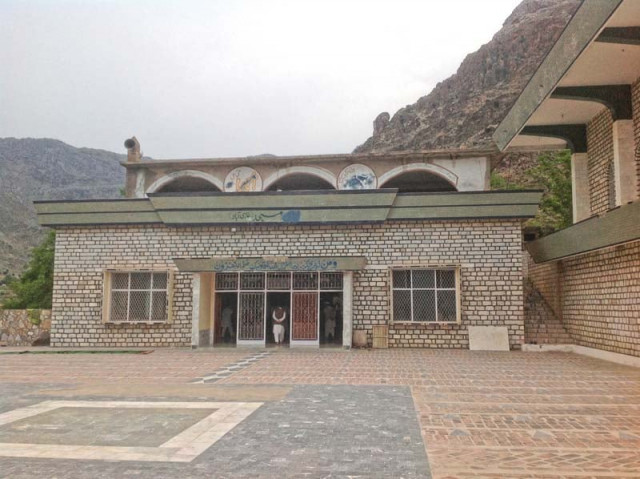Haji Sahib Turangzai: Bastion of freedom movement remembered after seven years
Political admin organises seminar to pay homage to Pukhtun reformer

The shrine of Haji Sahib Turangzai in Mohmand Agency. PHOTOS: MUREEB MOHMAND/EXPRESS
Following the Lal Masjid operation conducted by Pakistan Army in Islamabad in August 2007, local militants led by Umer Khalid captured Haji Sahib’s shrine and declared it the new Lal Masjid. The reformer’s final resting place remained under the Taliban juggernaut for several years and, among other things, was used as a court by the outlawed group.

The shrine of Haji Sahib Turangzai in Mohmand Agency. PHOTOS: MUREEB MOHMAND/EXPRESS
“It was during the 2011 military operation that security forces seized control of the shrine,” said tribal elder Malik Maujood Khan, narrating the events to APA Zeeshan Abdullah during the latter’s visit to examine arrangements for the conference.
Maujood said following independence, some of Haji Sahib’s descendants revolted against the Pakistani state and announced their allegiance to the Afghan government and propagated the establishment of Pukhtunistan. “The Ayub Khan administration took action against his family members who were forced to seek refuge in Afghanistan. They returned only after the Russian invasion of the neighbouring country,” he said.
Songs of praise
The urs of the Pukhtun warrior, recognised particularly for his participation in the struggle against British colonisers, is held every year from April 13 to April 15.
Historians, educationists and scholars from all over the province paid homage to the revered leader during the three-day ceremony this year. Amongst them was poet Gul Mohammad Mohmand, who is a devotee of Haji Sahib. Talking to The Express Tribune, Gul said multiple programmes are held simultaneously during the urs. “Ulema deliver speeches elaborating the life and times of Haji Sahib and poetry and eulogy sessions are also held.”
The legacy
Haji Sahib is an integral part of Pukhtun folklore and is widely considered as the symbol of resistance against all forms of oppression.
Haji Sahib was born Fazal Wahid in Turangzai village of Charsadda, circa 1859. A disciple of Sheikhul Hind Maulana Mahmoodul Hasan Deobandi, Haji Sahib was invited by Sahibzada Abdul Qayyum Khan to inaugurate the prestigious Islamia College Peshawar.
The relevance of Haji Sahib’s foresight gained significance over the years as he is credited with establishing innumerable educational institutions across Pukhtun lands. He battled the colonial regime and regressive social norms simultaneously, leaving a footprint on the pages of Pukhtun history.
In his book Reform and Resistance in Colonial India: A Survey of Haji Sahib Turangzai's Movement in the North-West Frontier, Dr Altaf Qadir evaluates the historical importance of social reforms introduced by the great leader. Haji Sahib’s chain of mosque schools was headquartered in Gadar, a settlement between Charsadda and Mardan. He urged fellow Pukhtuns to shun age-old practices, reform family life and resist political oppression exerted by the British, the landowners and nawabs. He was an avid proponent of interfaith harmony and banned the abduction of Hindus and the British for ransom.
He was an active member of Reshmi Roomal Tehreek and was a close aide of nationalist leader and pacifist Khan Abdul Ghaffar Khan.
Published in The Express Tribune, April 18th, 2015.













COMMENTS
Comments are moderated and generally will be posted if they are on-topic and not abusive.
For more information, please see our Comments FAQ